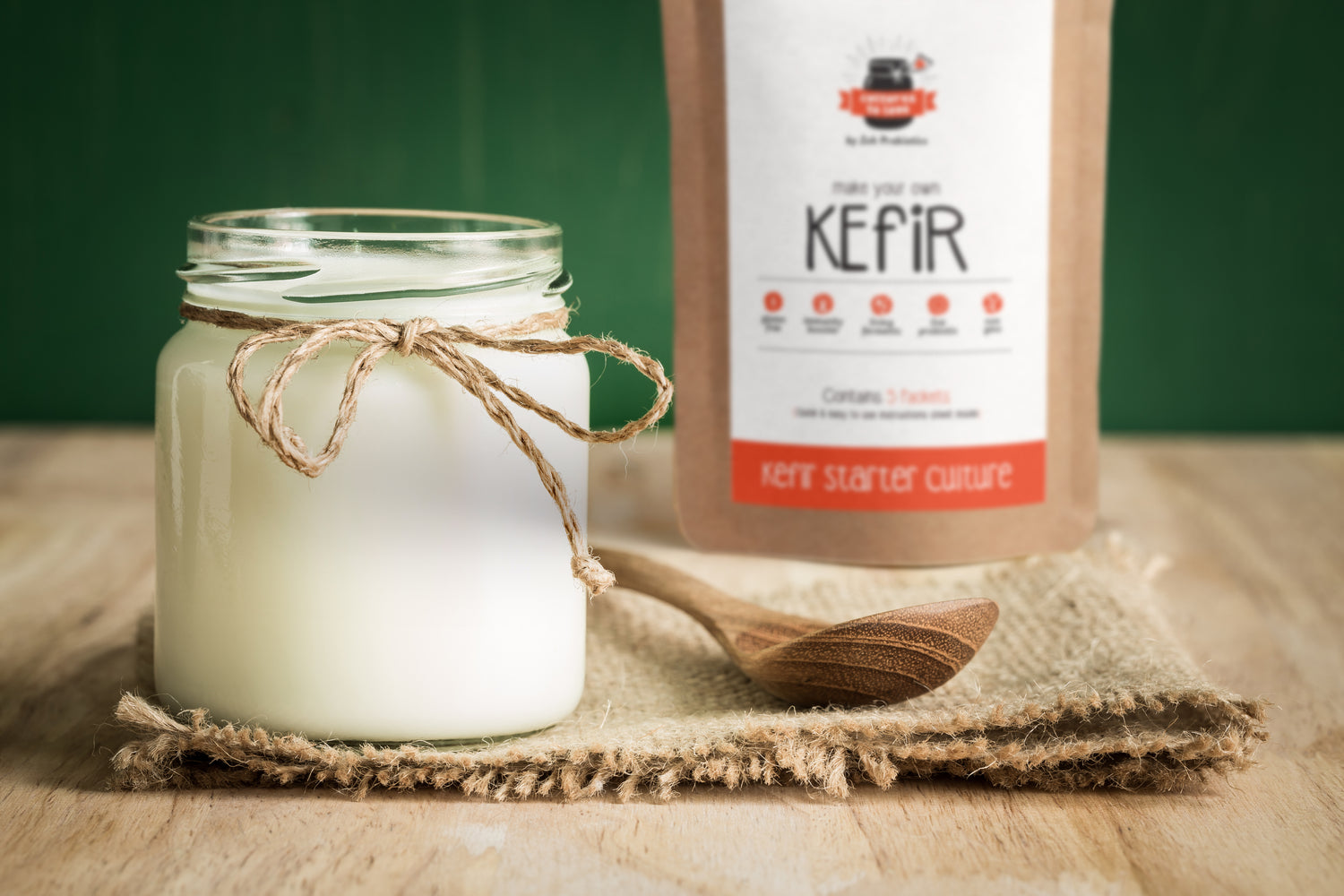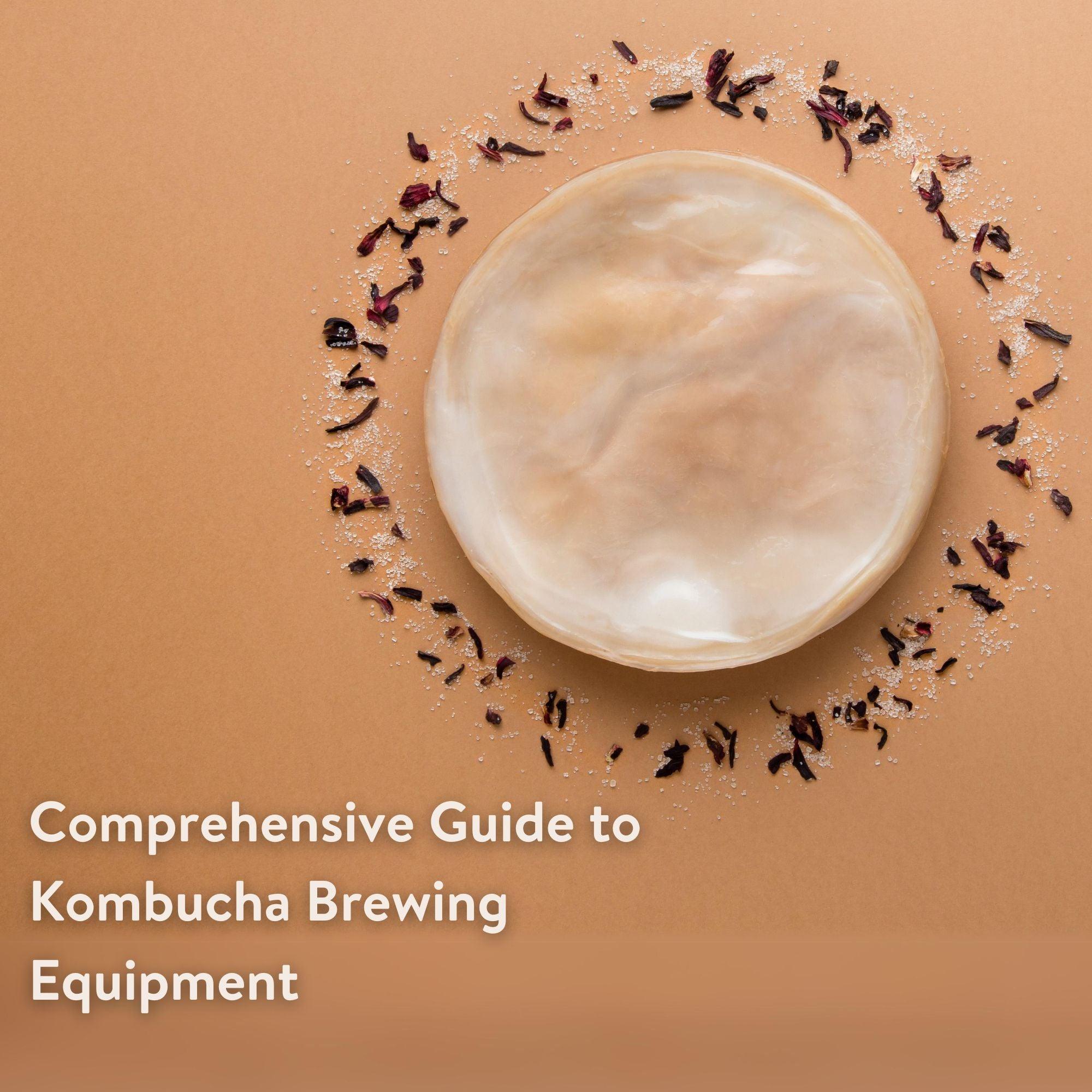Are you confused by the many probiotic drinks out there? Each one claims to be the best for your gut health. The global probiotics market is growing fast, expected to hit USD 77.12 billion in 2022. This growth rate is 14.0% from 2023 to 20301. But how do you pick between kefir, yoghurt, and kombucha?

Kefir comes from the Caucasus mountains and ferments for 12 to 48 hours. Kombucha takes 7 to 30 days to ferment2. Yoghurt is a favourite in many cultures, with lots of types and probiotic strains. Kombucha is a fermented tea drink, rich in probiotics and antioxidants, and is great for those who can't have dairy2.
All three drinks help keep your gut healthy. They can prevent and treat diarrhoea, boost your immune system, and help with digestive issues1. But, they differ in nutrition, probiotic strains, and health benefits. Your choice depends on what you prefer and your health goals.
Key Takeaways:
- Kefir, yoghurt, and kombucha are all probiotic-rich drinks that support gut health and overall wellness.
- Each drink has distinct fermentation processes, probiotic strains, and nutritional profiles.
- Kefir is a fermented milk drink, yoghurt is a dairy-based probiotic staple, and kombucha is a fermented tea beverage.
- When choosing between these drinks, consider factors such as individual health goals, dietary preferences, sugar and alcohol content, and caffeine sensitivity.
- Incorporating a variety of probiotic drinks into your diet can provide a range of health benefits and support a diverse gut microbiome.
Understanding Probiotics and Their Benefits

Probiotics are live microorganisms that bring many health benefits. They help keep the gut microbiome balanced. This supports digestion, mental health, and the immune system3.
What Are Probiotics?
Probiotics are live microbes like bacteria and yeasts. They grow in foods through fermentation. This method has been used for ages to preserve food3.
When we eat probiotics, they help balance the body's bacteria. This is especially important in the gut lining.
The Gut Microbiome and Its Importance
The gut microbiome is full of trillions of microorganisms in our digestive tract. It's a complex community of bacteria, fungi, and viruses. Probiotics help strengthen this community by adding "good" bacteria.
This is important because antibiotics can deplete good bacteria. Probiotics protect the gut from harmful bacteria3.
Health Benefits of Probiotics
Probiotics have many health benefits. They greatly impact the gut microbiome. Studies show that probiotics can:
- Improve digestion by enhancing nutrient absorption and reducing gut problems3
- Boost the immune system by increasing antibody and immune cell production3
- Help mental health by improving the gut-brain axis, reducing anxiety and depression4
- Prevent and treat allergies and infections3
- Support a healthy weight by affecting appetite and metabolism3
Recent research by Magalhães-Guedes (2022) studied the role of psychobiotic therapy in reinforcing the immune system, highlighting the potential of probiotics in supporting overall well-being4.
More research shows that probiotics are key for good health. They greatly affect the gut microbiome. Eating probiotic-rich foods and taking supplements can help support digestion, mental health, and the immune system.
Introducing Kefir: The Fermented Milk Drink
Kefir, a fermented milk drink, has become popular for its taste and health benefits. It comes from the Caucasus region, where it's been loved for centuries.
What Is Kefir?
Kefir is made by adding kefir grains to milk. These grains are a mix of bacteria and yeast. They ferment the milk, making it tangy and bubbly, full of probiotics.

How Is Kefir Made?
To make kefir, kefir grains are mixed with milk and left to ferment at room temperature for 24-48 hours. The grains break down the milk's lactose, creating lactic acid, carbon dioxide, and ethanol. This process preserves the milk and adds vitamins, minerals, and probiotics.
Kefir can be made from cow, goat, sheep, or soy milk. The type of milk affects the flavor and nutrition of the kefir.
Nutritional Profile and Probiotic Content of Kefir
Kefir is packed with protein, calcium, and B vitamins. A cup of low-fat kefir has:
- 100 calories
- 11 grams of protein
- 30% of the RDI of calcium
- 20% of the RDI of vitamin D
- 15% of the RDI of vitamin B2 (riboflavin)
- 10% of the RDI of vitamin B12
- 10% of the RDI of magnesium
- 10% of the RDI of phosphorus
Kefir is also known for its probiotics. It has Lactobacillus, Bifidobacterium, and Saccharomyces species. These help with digestion, immune function, and bone health. Drinking kefir daily can reduce inflammation and improve bone density in people with osteoporosis5.
Kefir's unique mix of nutrients and probiotics makes it a superfood for health and well-being.
Kefir is becoming a favorite in health-focused homes worldwide. Its taste, nutrition, and probiotics make it a great choice for adding probiotics to your diet.
Yogurt: A Probiotic Staple
Yogurt is a fermented dairy food linked to lower heart disease and Type 2 diabetes risks6. Making it involves heating milk, cooling it, and combining it with two live cultures. These are Lactobacillus bulgaricus and Streptococcus thermophilus. Some yogurts also include other beneficial bacteria, listed in the ingredients.
Different Types of Yogurt and Their Probiotic Content
Yogurt comes in many forms worldwide. You might enjoy plain, flavoured, Greek, French, Icelandic skyr, lactose-free, or yogurt drinks like Indian lassi. Each type is a good source of probiotics, but the amount can vary.
Yogurt often has fewer probiotic strains than kefir. It usually includes Lactobacillus bulgaricus and Streptococcus thermophilus. Some yogurts also have Bifidobacteria and Lactobacillus acidophilus7. Greek yogurt, for example, is thick and creamy, with 20 grams of protein in a 250g container8.
Yogurt's Nutritional Benefits
Yogurt is not just good for your gut. It's also packed with calcium for strong bones and teeth. Many yogurts are fortified with vitamin D, helping with calcium absorption and boosting the immune system.
While yogurt is great, kefir offers even more benefits. Kefir has over 50 types of beneficial bacteria and yeast, unlike yogurt's limited "good" bacteria and no yeast7.
| Yogurt Type | Key Characteristics |
|---|---|
| Greek Yogurt | Thick, creamy texture; high protein content. Strained |
| Icelandic Skyr | Similar to Greek yogurt; runny, mild and liquidy |
| Lassi | Indian yogurt drink; can be sweet or savoury made from Indian mesophilic culture |
| Lactose-Free Yogurt | Suitable for lactose-intolerant individuals |
Adding yogurt to your diet can be tasty and good for your gut health. With so many types available, you're sure to find one that fits your taste and dietary needs.
Kombucha: The Fermented Tea Sensation
Kombucha, a fermented tea drink, has become very popular lately. It comes from ancient China and is loved for its taste and health benefits. Fermented foods like yogurt, kefir, kombucha, and sauerkraut are big in 2018. This shows people care about their gut health and overall well-being9.

The Origins and Production of Kombucha
Kombucha starts with black or green tea, sugar, and a SCOBY. The SCOBY is a mix of bacteria and yeast. This mix ferments for 7 to 30 days10.
During fermentation, the SCOBY breaks down the tea and sugar. This creates good stuff like organic acids, enzymes, and antioxidants.
Green tea is great for kombucha because of its health benefits. The fermentation makes these benefits even better11. Kombucha is full of vinegar, B vitamins, and prebiotics. It could be good for your health11.
Kombucha's Probiotic and Antioxidant Properties
Kombucha is loved for its probiotics. The fermentation helps grow good bacteria. This is good for your gut11.
It also has lots of antioxidants. These help fight stress and inflammation. Drinking kombucha regularly might make you healthier11.
| Fermentation Time | Sugar Content | Probiotic Strains |
|---|---|---|
| 7-30 days | 4-6 grams per cup | Bifidobacterium, Lactobacillus |
It's important to watch the sugar in kombucha. Choose ones with less than 4 to 6 grams of sugar per cup10. Eating it in moderation is best10.
The fermented foods market is growing fast, with kombucha leading the way. People want natural drinks that are good for their gut and overall health9.
Kefir vs Yogurt vs Kombucha: A Comparative Analysis
Kefir, yogurt, and kombucha are all packed with probiotics. Each has its own set of benefits and tastes. Let's look at how they compare in terms of probiotic diversity, nutritional value, flavor, and versatility in recipes.
Probiotic Strain Diversity
Kefir has over 50 types of beneficial bacteria and yeast. This makes it a stronger digestive aid than yogurt12. Kombucha also supports digestion with its yeast, bacteria, and acids12. Probiotic supplements focus on specific strains, unlike fermented foods which offer a mix13. High-quality probiotics aim to increase bacterial diversity in the gut13.
Nutritional Composition
Kefir and kombucha have different nutritional profiles. Kefir has 161 calories per cup, while kombucha has about 5014. Kefir also has more protein, 11 grams per cup, and no protein in kombucha14. Kefir is richer in nutrients like protein, carbs, calcium, and vitamins, offering around 100 calories in low-fat versions12.
| Nutrient (per 1 cup/240mL) | Kefir | Kombucha |
|---|---|---|
| Calories | 161 | 50 |
| Protein (g) | 11 | 0 |
| Total Fat (g) | 2 | 0 |
| Total Carbohydrates (g) | 24 | 12 |
| Total Sugar (g) | 20 | 11 |
Taste and Texture
Kefir tastes creamy and tangy, like drinkable yogurt12. Kombucha, on the other hand, is fizzy and slightly sweet, with endless flavor options12.
Versatility in Recipes and Consumption
Kefir is great on its own, in smoothies, or as a dressing. Kombucha is often drunk alone or used in cocktails. Both can add a tangy twist to salad dressings.
While commercial kombucha has less than 0.5% alcohol, homemade batches can reach up to 3%14.
It's best to limit kombucha intake to four ounces, 1 to 3 times a day, to avoid stomach issues and headaches12.
Factors to Consider When Choosing a Probiotic Drink
When picking a probiotic drink, think about your health goals and what you like to eat. Kefir, yogurt, and kombucha each have special benefits. They fit different lifestyles and needs15.
Individual Health Goals and Dietary Preferences
If you can't digest lactose or eat no dairy, kombucha is a good pick. It's made from tea and has no dairy16. But, if you want more protein or like creamy textures, kefir or yogurt might be better15. Always talk to a doctor before starting probiotics, especially if your immune system is weak or you're on treatments17.
Sugar and Alcohol Content
Kombucha is good for those watching sugar, as fermentation cuts down sugar content16. Choose kombucha with under 4 grams of added sugar per 100ml serving to keep sugar low16. Kefir, especially flavored kinds, might have more sugar16.
Kombucha sold in stores has about 0.5% alcohol, making it nonalcoholic. Homemade kombucha might have a bit more alcohol16. Kefir has a low alcohol level, usually 0.5-2%16.
Caffeine Sensitivity
Kefir is caffeine-free, making it great for those who can't handle caffeine or want to avoid it16. Kombucha, made from tea, does contain caffeine16. If you like kombucha but want less caffeine, choose varieties with less tea or decaf tea.
| Consideration | Kefir | Kombucha |
|---|---|---|
| Dairy-Free | No | Yes |
| Low Sugar | Varies | Yes (if low added sugar) |
| Alcohol Content | 0.5-2% | 0.5% (store-bought) |
| Caffeine Content | None | Yes (from tea) |
Incorporating Probiotic Drinks into Your Diet
Adding probiotic drinks like kefir, yogurt, and kombucha to your diet is tasty and good for your gut. Kefir, a fermented milk drink, has up to 61 strains of good microbes18. It's easy to get enough good bacteria by drinking these probiotics19.
Look for probiotic drinks in different flavours to match your taste. People like fruity, tangy, or unique flavours like ginger and turmeric19. Try different brands and flavours to find your favourites, making it fun to add them to your daily routine.
It's important to store and refrigerate these drinks right to keep them fresh and full of probiotics. Kombucha, full of probiotics, antioxidants, and nutrients, should be kept cold and lasts weeks to months18. Kefir should also be refrigerated and drunk within a week for the best taste and health benefits.
A 2021 review in Frontiers in Nutrition suggested that kefir may be beneficial for conditions such as diabetes, cardiovascular disease, immunity, and neurological disorders20.
To get the most health benefits from probiotic drinks, eat a balanced diet with prebiotics. Prebiotics are fibres that feed the good bacteria in your gut. Here are some ideas:
- Put kefir in your morning smoothie with prebiotic fruits like bananas or berries
- Drink kombucha as a midday boost or with meals
- Use yogurt in salad dressings or dips with prebiotic veggies like garlic, onions, or asparagus
By making probiotic drinks a regular part of your diet, you can help your gut health and overall health. Remember to try different things, store them right, and eat foods that go well with them. Always listen to your body and talk to a doctor if you have any health worries.
Potential Side Effects and Precautions
Fermented drinks like yogurt, kefir, and kombucha are popular worldwide for their health benefits21. It's important to know about possible side effects and precautions before adding them to your diet. These drinks contain live microorganisms that can help your body22. But, drinking too much too fast or having certain health issues might cause digestive problems or allergic reactions.
Digestive Discomfort and Allergic Reactions
Starting with probiotic drinks might make you feel bloated or have cramps as your gut gets used to the new microbes. To avoid discomfort, start small and slowly increase your intake. Drinking more than 500ml of kombucha 1 to 3 times a day can cause headaches or nausea. Rarely, people might have allergic reactions to these drinks, so be careful and talk to a doctor if you're worried.
Interactions with Medications and Health Conditions
Some people should be careful or avoid probiotic drinks because of possible interactions with medications or health conditions. Pregnant women, children, people with liver disease, HIV, kidney problems, weakened immune systems, or alcohol addiction should talk to their doctor first. Probiotics might be suggested by doctors to fix gut imbalances after illnesses or treatments22. But, the FDA doesn't regulate probiotics, so it's best to get advice from a healthcare provider for your specific needs22.
FAQ
What are the main differences between kefir, yogurt, and kombucha?
Kefir is a fermented milk drink. Yogurt is a fermented dairy product. Kombucha is a fermented tea. They differ in ingredients, probiotic strains, nutrition, and taste. Kefir and yogurt are dairy-based, while kombucha is dairy-free and vegan.
Which probiotic drink is better for lactose-intolerant individuals?
Kombucha is best for those allergic to lactose, as it's dairy-free. Water-based kefir is also a good option for those with lactose intolerance.
How do the probiotic strains in kefir, yogurt, and kombucha differ?
Kefir has a wide range of probiotic strains, including bacteria and yeasts. Yogurt has fewer beneficial bacteria. Kombucha's probiotics depend on the SCOBY used.
Can I drink kefir or kombucha every day?
Drinking kefir daily can be healthy, as it's full of probiotics and nutrients. But watch the sugar in flavoured kefir. Kombucha should be limited to 4 ounces, 1 to 3 times a day.
How should I store kefir and kombucha to maintain their quality?
Keep both kefir and kombucha in the fridge to slow fermentation. Kefir lasts up to a week or longer. Kombucha can last weeks to months, but taste may change.
Can everyone consume kombucha safely?
Some groups should avoid kombucha, like pregnant women and those with liver disease. Always check with your doctor before trying probiotic drinks.
What are the potential side effects of consuming probiotic drinks?
Starting probiotic drinks may cause mild digestive issues like bloating. Allergic reactions are also possible. If symptoms worsen, stop drinking and see a doctor.
Source Links
- Probiotic Drinks and their Health Benefits
- Kefir vs Kombucha: The Ultimate Verdict
- Kefir Yogurt | The Difference Between Kefir vs Yogurt - Cultures For Health
- Biological Significance of Probiotic Microorganisms from Kefir and Kombucha: A Review
- 8 Fermented Foods and Drinks You Should Try, from Kefir to Kimchi
- These are the 10 best probiotic foods to add to your diet, according to a dietitian
- Kefir vs yoghurt: which is healthier? — Hello Gut Health
- Top 7 Probiotic-Rich Foods | Ochsner Health
- FNB News - Fermented foods, including yogurt & kombucha, number one trend in 2018
- Kefir vs. Kombucha
- Ornish Lifestyle Medicine | Kefir, Kombucha and Sauerkraut: Fermented Foods for Your Heart Health
- Which is Better Kombucha or Kefir?
- Kombucha vs. Yogurt vs. Probiotic Supplements
- Kefir vs. Kombucha: Which Is Healthier?
- 11 Probiotic Foods That Are Super Healthy
- Kefir vs. Kombucha: Which Probiotic Drink Is Better?
- How To Pick the Best Probiotic
- 8 Probiotic Beverages to Sip on for a Healthy Gut
- 15 Best Probiotic Drinks for Gut Health
- 7 Must-Eat Fermented Foods for a Healthy Gut
- An overview of probiotic health booster-kombucha tea
- What Are Probiotics & What Do They Do?



